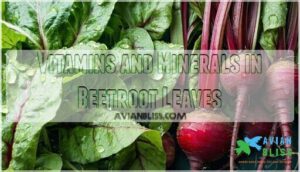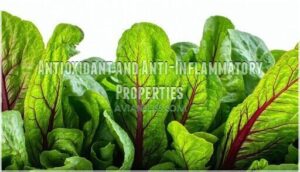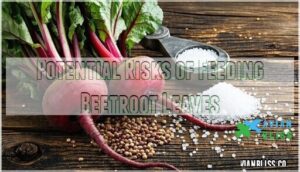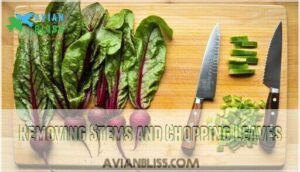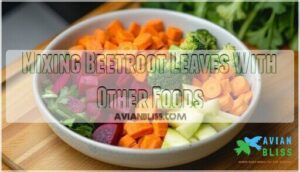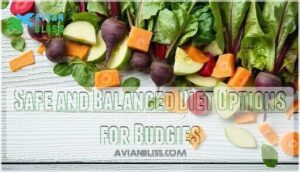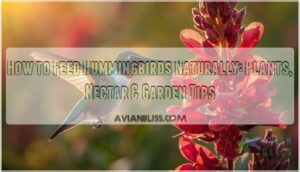This site is supported by our readers. We may earn a commission, at no cost to you, if you purchase through links.
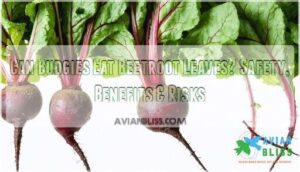
But here’s the catch: beetroot leaves have oxalates in them. These can mess with how your budgie absorbs calcium and might cause kidney problems if you overdo it.
Think of it like seasoning: a little goes a long way.
Keep beetroot leaves to less than half a percent of your budgie’s daily food. Give them a good rinse to get rid of any pesticides, and slice them into bite-sized pieces.
When offered in small amounts and prepared the right way, these leaves are a safe snack—but a little care with portions keeps things healthy.
Table Of Contents
- Key Takeaways
- Can Budgies Eat Beetroot Leaves Safely?
- Nutritional Benefits of Beetroot Leaves for Budgies
- Potential Risks of Feeding Beetroot Leaves
- How to Prepare Beetroot Leaves for Budgies
- Safe and Balanced Diet Options for Budgies
- Frequently Asked Questions (FAQs)
- Are beetroot leaves a suitable substitute for leafy greens?
- Can budgies with liver disease eat beetroot leaves?
- How often can budgies eat beetroot leaves in summer?
- Do budgies prefer raw or cooked beetroot leaves more?
- Can baby budgies eat beetroot leaves?
- Do beetroot leaves change budgie droppings color?
- Should beetroot leaves be cooked or raw?
- Can beetroot leaves replace other leafy greens?
- How long do fresh beetroot leaves last?
- Conclusion
Key Takeaways
- Beetroot leaves are safe for budgies in moderation—offer them once or twice weekly in small portions (about the size of your bird’s head) to avoid oxalate buildup, which interferes with calcium absorption and can lead to kidney problems.
- These greens pack serious nutrition with vitamins A, C, and K, plus minerals like calcium and iron, along with antioxidants that support your budgie’s immune system and digestion when properly balanced in their diet.
- Always wash beetroot leaves thoroughly to remove pesticide residues (standard washing only removes 11-48% of them), chop them into thumbnail-sized pieces, and remove tough stems before serving to prevent choking hazards.
- Watch for digestive upset signs like watery droppings, loss of appetite, or lethargy after introducing beetroot leaves—if these occur, remove the leaves immediately and contact your avian vet, especially since variety matters more than relying on any single green vegetable.
Can Budgies Eat Beetroot Leaves Safely?
Budgies can enjoy beetroot leaves now and then, as long as you keep portions small.
Just remember, these leaves have oxalates, which can mess with calcium absorption, so it’s best not to go overboard.
Are Beetroot Leaves Toxic to Budgies?
If you’ve ever wondered whether those vibrant beetroot leaves sitting in your kitchen are friend or foe to your budgie, you’re not alone. Good news: beetroot leaves aren’t toxic to budgerigars. However, they do contain oxalates, which can interfere with calcium absorption and potentially lead to kidney problems if your bird eats too much.
So, it’s important to offer beetroot greens in small amounts and make sure they’re cleaned and prepared properly before sharing them with your bird.
Recommended Serving Frequency and Portion Size
Let’s explore Recommended Serving Frequency and Portion Size in a way that feels clear and practical. Offer beetroot leaves once or twice weekly, not daily. A small leaf piece—about the size of your budgie’s head—works well.
Offering the right portion keeps your budgie’s diet in check and helps prevent too much oxalate from building up.
As you introduce anything new, keep an eye on your bird to see how they’re handling the change.
Preparation impact matters: thoroughly washed, chopped leaves mixed with other vegetables promote healthy diet balance. Frequency recommendations help avoid long-term effects on calcium absorption, keeping your bird’s nutrition on track.
Avian Veterinarian Guidelines on Beetroot Leaves
Both the World Parrot Trust and Avian and Animal Hospital say beetroot leaves are fine for budgies—as long as you mix them into a varied diet.
Vets recommend offering these greens now and then, rather than every day, since they contain oxalates.
Nutritional guides confirm beetroot tops benefit healthy foods for bird nutrition, and you can even weave them into cages for enrichment. A varied diet including whole grains is essential for prime health.
So, as the experts put it, budgies can enjoy beetroot leaves safely—as long as you keep things balanced and don’t overdo it.
Nutritional Benefits of Beetroot Leaves for Budgies
Beetroot leaves pack a surprising nutritional punch for your budgie, loaded with vitamins A, C, and K plus essential minerals like calcium and iron.
These leafy greens offer antioxidants and fiber that can boost your bird’s digestion and immune system when served in moderation.
Vitamins and Minerals in Beetroot Leaves
Beetroot leaves pack impressive nutrients that promote bird health. Your budgie benefits from vitamin A (about 120 micrograms per cup), which strengthens vision and immune function. Vitamin C reaches roughly 11 milligrams per cup, boosting antioxidant defenses. You’ll also find remarkable vitamin K levels—around 152 micrograms per cup—plus vitamin B9 for cell growth.
The mineral density includes calcium, iron, and potassium, while fiber content aids digestion. These greens deliver concentrated bird nutrition in every bite. Beetroot leaves are also known for their anti-inflammatory properties.
Antioxidant and Anti-Inflammatory Properties
Your budgie’s cells are constantly fighting invisible battles against free radicals, and beetroot leaves bring powerful weapons to the fight. These leafy greens contain betalains—unique antioxidants that scavenge harmful molecules and reduce inflammation throughout your bird’s body. Here’s what makes them a superfood for bird health:
- Betalain benefits: Neutralize reactive oxygen species from infections and stress
- Free radical defense: Lower oxidative damage markers by up to 38% in studies
- Reducing inflammation: Suppress inflammatory proteins TNF-α and IL-6 naturally
- Immune aid: Boost enzymes like superoxide dismutase that protect cells
- Antioxidant mechanisms: Phenolic acids work alongside flavonoids for thorough protection
These compounds work together, giving your budgie’s immune system the backing it needs.
How Beetroot Leaves Support Budgie Health
All these nutrients team up to give your budgie a real wellness boost. Plus, the fiber keeps their digestion on track, so everything moves along smoothly.
Antioxidants provide immune boost and detox assistance, helping budgerigars fight off everyday stressors. Meanwhile, nitrates promote heart health by encouraging healthy blood flow.
Adding beetroot leaves to your budgie’s diet helps them soak up nutrients more easily. When mixed in with other healthy foods, these leaves become a tasty way to support balanced nutrition and overall well-being.
Potential Risks of Feeding Beetroot Leaves
While beetroot leaves offer nutritional benefits, they aren’t without risks for your budgie.
The main concerns include oxalate content that can interfere with calcium absorption, potential pesticide residues on unwashed leaves, and the possibility of digestive upset if introduced too quickly or fed in excess.
Oxalate Content and Calcium Absorption
Unfortunately, beetroot leaves pack a serious punch regarding oxalate content. These greens contain around 1,500 milligrams of oxalate per 100 grams—that’s roughly ten times higher than the beetroot itself. This creates real concerns about calcium deficiency and kidney stones in budgerigars.
- Oxalate toxicity becomes a risk when beetroot leaves exceed 0.5% of your budgie’s daily diet
- Calcium deficiency occurs because oxalates bind to dietary calcium, making it unavailable for absorption
- Kidney stones can form from calcium oxalate crystals depositing in your bird’s system
- Dietary balance requires mixing high-oxalate greens with low-oxalate alternatives
- Safe consumption means offering beetroot leaves only occasionally, not as a dietary staple
The oxalates virtually steal calcium from your budgie’s digestion, potentially leading to serious health complications if you’re not careful with portion control.
Pesticide and Chemical Residues
Most leafy greens carry pesticide residues that standard washing removes only partially. Even thorough washing eliminates just 11-48% of these residues. Beetroot leaves often contain over 50 different pesticides, including compounds more toxic to birds than mammals.
Your budgie faces higher exposure pathways and residue toxicity than other pets. Choose organic alternatives when possible, as they greatly reduce pesticide exposure and provide safer vegetables for your feathered friend.
Signs of Digestive Upset or Allergic Reactions
Even the healthiest budgie can have a bad reaction to new foods, so knowing what warning signs to watch for could save your feathered friend from serious discomfort. Watch for these upset telltale signs:
- Watery or unusual fecal matter consistency
- Loss of appetite or refusing safe food
- Lethargy or decreased activity levels
- Vomiting or regurgitation after eating
- Difficulty breathing or wheezing sounds
If you notice allergic reaction symptoms, take immediate actions by removing the beetroot leaves and offering fresh water. Contact your vet for veterinary consultation if digestive issues persist in budgerigars.
How to Prepare Beetroot Leaves for Budgies
Getting beetroot leaves ready for your budgie takes a little care, but it’s the best way to keep your feathered friend safe and healthy.
The right washing, chopping, and serving methods will help you remove any harmful residues while making the leaves easy for your budgie to enjoy.
Washing and Cleaning Methods
Think of those beetroot leaves as tiny sponges that soak up everything from pesticides to dust—proper washing turns them from potential trouble into safe treats for your budgie.
Start with cold running water to rinse away surface dirt and debris. For organic cleaning without harsh detergents, gently rub each leaf under the stream, paying attention to crevices where residue hides.
This simple vegetable preparation step ensures your bird gets safe food every time.
Removing Stems and Chopping Leaves
Once your beetroot leaves are squeaky clean, it’s time to turn them into bite-sized pieces your budgie can actually handle. The thick stems are too tough for budgerigars, so you’ll want to remove them completely.
Here’s your leaf preparation checklist:
- Strip away all stems – They’re harder to digest and can pose choking risks
- Chop leaves into small pieces – Think thumbnail-sized for easy eating
- Check for any remaining tough veins – Remove these thick parts too
The right size really makes a difference. You want small, easy-to-eat pieces so your budgie can nibble without any trouble.
Mixing Beetroot Leaves With Other Foods
Combining beetroot leaves with your budgie’s favorite vegetables creates a colorful mix that makes healthy eating more appealing and helps mask any unfamiliar tastes.
| Beetroot Mix | Complimentary Flavors | Portion Control |
|---|---|---|
| Beet + Spinach + Apple | Sweet crunch balances earthy greens | 10% beetroot, 90% familiar foods |
| Beet + Carrot + Broccoli | Orange-red colors attract budgerigars | Small pinch mixed with regular vegetables |
| Beet + Kale + Cucumber | Mild cucumber softens strong flavors | Quarter-sized serving for safe food introduction |
Mixing up recipes like these gives your bird a fun, nutritious way to eat more plants. It keeps their meals interesting and ensures they get a good variety, without overdoing any one ingredient.
Safe and Balanced Diet Options for Budgies
Beyond beetroot leaves, your budgie needs a well-rounded diet that includes safe fruits, vegetables, and grains while avoiding harmful foods.
A varied menu keeps your feathered friend healthy and prevents nutritional deficiencies that can develop from eating only seeds.
Fruits and Vegetables Safe for Budgies
Your budgerigar’s nutritional foundation depends on offering diverse, safe produce alongside their pellet base. Fresh vegetables should make up 20-30% of your bird’s daily intake, while safe fruit options remain under 5% due to sugar content.
Here are three essential categories of safe food for birds:
- Leafy powerhouses – Kale, spinach, and beetroot leaves provide vitamins A, C, and K
- Colorful vegetables – Carrots, broccoli, and sweet potatoes offer antioxidants and fiber
- Occasional fruits – Apples, berries, and melons satisfy natural cravings when portioned correctly
Make sure to give all produce a good rinse before feeding it to your budgie. Cut veggies into small, easy-to-eat pieces, and switch up what you offer each day. This keeps your bird’s diet balanced and helps prevent picky eating down the road.
Foods and Ingredients to Avoid
Several toxic foods pose serious threats to your budgie’s health. Avocado tops the dangerous list, causing fatal cardiac damage within 12 hours. Chocolate and caffeine trigger seizures at tiny doses. Apple seeds release deadly cyanide within minutes.
| Toxic Food | Primary Danger | Reaction Time |
|---|---|---|
| Avocado | Cardiac failure | 12 hours |
| Chocolate/Caffeine | Seizures, arrhythmias | Minutes |
| Apple/Pear Seeds | Cyanide poisoning | 15-30 minutes |
| Onion/Garlic | Blood cell damage | 1 hour |
| Rhubarb Leaves | Kidney failure | Immediate |
But it’s not just plants and foods you need to worry about. Everyday household items can be just as dangerous. In fact, lead paint and Teflon fumes are behind 40% of budgie poisoning cases.
Even a little too much salt—over 1%—can lead to kidney failure. These rules aren’t just suggestions; they’re essential for keeping your budgie safe and healthy.
Importance of Dietary Variety and Moderation
Just like you wouldn’t eat the same meal every single day, your budgie thrives on a rainbow of different foods that keep both their body and mind healthy. Food rotation prevents nutritional gaps while keeping meals exciting for your feathered friend.
- Mix colors daily – orange carrots, green spinach, red bell peppers create balanced nutrition
- Rotate treats weekly – alternate between fruits and vegetables to maintain interest
- Offer variety textures – crunchy apples, soft bananas, leafy greens satisfy natural foraging instincts
- Balance portions carefully – 80% pellets, 15% fresh produce, 5% healthy treats maintains ideal health
- Monitor your bird’s preferences – some budgies love broccoli while others prefer sweet corn
Giving your budgie a mix of foods is a lot like what wild parakeets get—plenty of variety keeps them healthy and curious.
Frequently Asked Questions (FAQs)
Are beetroot leaves a suitable substitute for leafy greens?
While beetroot leaves offer solid Beetroot Nutrition and can supplement your parakeet diet, they shouldn’t replace core leafy greens entirely.
Think of them as a nutritious side dish rather than the main course for ideal Bird Wellness and Dietary Balance.
Can budgies with liver disease eat beetroot leaves?
For budgerigars with liver disease, beetroot leaves require careful consideration. These leaves contain oxalates that may stress compromised liver function, potentially interfering with detoxification processes. Consult your avian veterinarian before introducing beetroot leaves into a liver disease management plan.
| Liver Disease Consideration | Beetroot Leaf Impact | Veterinary Recommendation |
|---|---|---|
| Mild liver dysfunction | Monitor oxalate intake | Limited portions with supervision |
| Moderate liver disease | Restrict high-oxalate foods | Avoid until liver function improves |
| Severe hepatic compromise | Complete dietary restriction | Focus on liver-friendly nutrition |
| Recovery phase | Gradual reintroduction possible | Professional dietary restriction guidelines |
When caring for birds with liver problems, it’s best to stick to foods that are gentle on their digestive system and support liver health.
Beetroot leaves do offer antioxidants, but because they’re high in oxalates, they might do more harm than good for birds with liver issues.
How often can budgies eat beetroot leaves in summer?
Your budgie’s summer diet can include beetroot leaves once or twice weekly, not daily.
While seasonal food variations matter for budgerigars, beetroot leaf frequency stays moderate year-round because oxalate content doesn’t change with weather, protecting healthy feeding habits and bird nutrition and health.
Do budgies prefer raw or cooked beetroot leaves more?
Most budgerigars prefer raw beetroot leaves because fresh greens offer:
- Crispier Leaf Texture that’s more appealing to bite
- Stronger natural flavors that attract budgie preferences
- Better nutritional retention compared to Cooking Methods
Raw vs Cooked preparation affects Vegetable preparation for birds—cooking softens leaves but may reduce bird nutrition and health benefits in your parrot diet.
Can baby budgies eat beetroot leaves?
Hold off on giving beetroot leaves to your young parrot until they’re through the weaning stage. When feeding baby budgies, it’s important to introduce fresh foods slowly—usually starting at around 8 to 10 weeks, when they begin eating solids.
Stick to gentle, low-oxalate veggies first, and save beetroot leaves for later. This way, you won’t overwhelm their developing digestive system or mess with the calcium they need to grow.
| Age Stage | Beetroot Leaf Safety | Budgie Diet Plans Recommendation |
|---|---|---|
| 0-8 weeks (Baby) | Not recommended | Focus on specialized hand-feeding formula or parent-fed seeds |
| 8-12 weeks (Weaning) | Introduce cautiously in tiny amounts | Begin mild greens like spinach; monitor closely for digestive issues |
| 12+ weeks (Juvenile/Adult) | Safe in moderation | Rotate beetroot leaves occasionally with varied parakeets-safe vegetables for bird nutrition and health |
Do beetroot leaves change budgie droppings color?
Yes, beetroot leaves can turn your budgie’s droppings red or pink. This happens because betalains—the pigments that give beetroot its deep color—pass through your bird’s digestive system. It’s completely normal and nothing to worry about.
- Red droppings after beetroot don’t mean digestive issues or bleeding
- The color change is temporary and fades once beetroot leaves are removed from the diet
- Fecal staining may also appear on cage surfaces, so clean regularly when feeding beetroot to parakeets
Should beetroot leaves be cooked or raw?
While cooking softens beetroot leaves and may ease digestion, raw leaves retain highest nutrients—vitamins A, C, and K remain intact.
Most parakeets handle raw, thoroughly washed greens just fine. If your bird seems hesitant, lightly steaming preserves nutrition better than boiling while softening texture.
Can beetroot leaves replace other leafy greens?
While beetroot leaves offer solid nutrition, they shouldn’t be your budgie’s go-to green vegetable. Think of them as a supporting player, not the star of the show. Variety matters more than relying on any single leafy green.
- Kale and spinach deliver different mineral profiles that complement beetroot’s nutrients
- Parsley and dandelion greens provide unique phytonutrients your budgie needs for peak health
- Rotating leafy greens prevents oxalate buildup and ensures balanced feeding strategies
- Beetroot leaves work best as an occasional addition to your parrot diet diversity plan
How long do fresh beetroot leaves last?
How quickly do your freshness factors fade? When properly stored in the refrigerator, beetroot leaves maintain their nutritional value for about three to five days.
For safe food handling with vegetables like beetroot for birds, check the leaves daily—wilting signals declining shelf life and reduced food safety.
Conclusion
Think of beetroot leaves as a spice rack ingredient—powerful in small doses, problematic in excess. Yes, can budgies eat beetroot leaves safely when you stick to tiny portions and proper preparation.
Balance these nutritious greens with diverse vegetables, quality pellets, and fresh water. Watch your budgie’s reaction after introducing any new food, and consult your avian vet if you notice digestive changes. Smart feeding habits today mean a healthier, happier companion tomorrow.
- https://theworldsrarestbirds.com/can-budgies-eat-beetroot-leaves/
- https://www.wwbirds.co.za/dir/beetroot-for-birds/
- https://queenslanderaviaries.com/blogs/news/bird-safe-vegetables
- https://www.reddit.com/r/parrots/comments/1huwzwp/dietary_oxalates_and_toxicity_warning/
- https://www.avianandanimal.com/feeding-guidelines-for-birds.html

